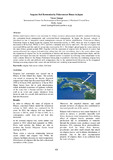Seagrass Bed Restoration by Fishermen at Hinase in Japan
Abstract
Habitat rehabilitation which is very important for fishery resources enhancement should be conducted following the community-based management and ecosystem-based management. In Japan, the Satoumi concept is introduced as one of integrated coastal management concepts for habitat rehabilitation. Fishermen at Hinase Fishermen Union in Japan began the eelgrass bed restoration activity in 1985, when the area of eelgrass bed decreased to 80 ha from 590 ha in 1945, and have continued such activity until now. The area of eelgrass bed recovered 200 ha and fish catch by set net also recovered in 2011. The fishers' group began the oyster culture in the same fishery ground around 1985. Together with the expansion of eelgrass bed, the harvest of oysters had increased because the eelgrass bed and oyster culture have the win-win relation, that is, the oyster culture helps the expansion of eelgrass bed by the assimilation of detritus and increase sun light transmittance depth, and the eelgrass bed helped decrease the mortality of cultured oysters in summer by lowering water temperature in the water column. Moreover the Hinase Fishermen Union plans to establish a fish farm by combining eelgrass bed, oyster culture in rafts and artificial reefs arrangement, that is, the spawned local fish grows in the designated farming area using eelgrass bed, oyster raft and artificial reef, resulting in increased fish harvest.
Citation
Yanagi, T. (2016). Seagrass bed restoration by fishermen at Hinase in Japan. In H. Kawamura, T. Iwata, Y. Theparoonrat, N. Manajit, & V. T. Sulit (Eds.), Consolidating the Strategies for Fishery Resources Enhancement in Southeast Asia. Proceedings of the Symposium on Strategy for Fisheries Resources Enhancement in the Southeast Asian Region, Pattaya, Thailand, 27-30 July 2015 (pp. 121-122). Samutprakan, Thailand: Training Department, Southeast Asian Fisheries Development Center.
Subject
environmental degradation; stocking density; resource management; survival; Catch/effort; brackishwater aquaculture; growth; socioeconomic aspects; brackishwater environment; fishing grounds; feeding; stocking (organisms); Feed; shrimp culture; aquaculture regulations; resource conservation; estuaries; carrying capacity; stock assessment; environmental impact; livelihoods; shrimp fisheries; cage culture; Culture effects; stocks; Philippines; Penaeus monodon

